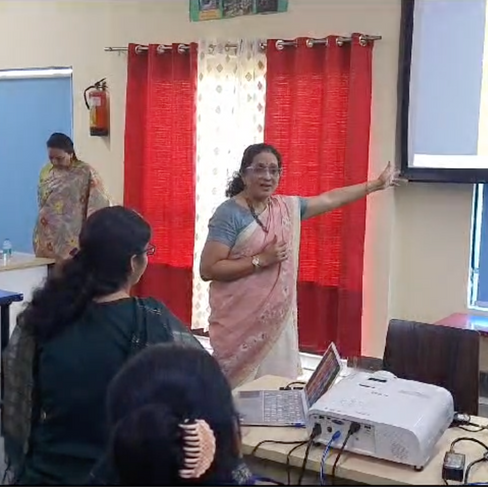
I recently got to visit Mir Public School, Aali Vihar, New Delhi under the aegis of the Central Board of Secondary Education’s Guru Dakshta (Induction Training) Program. The Guru Dakshta Program aims to equip principals and teachers of newly affiliated schools with the CBSE system as well as existing CBSE-affiliated schools with the abilities and resources needed to be successful in their roles. (There are no senior secondary grades at Mir Public School, with their first class tenth batch appearing for the CBSE board examinations in the coming year)
The Induction Training Programme introduces teachers and school heads to the structure, policies, and guidelines of all the constituent departments and units of CBSE, including Training, Examination, Affiliation, Academics, Skill Education, IT, Professional Examination, CTET, CoEs, and ROs.
To break the ice and set the ball rolling, I asked them whether they agreed with me that being a ninth grade teacher is probably one of the hardest jobs in the country. You see, no student can fail until they complete primary school (classes 1 to 8) as per the no-detention policy under the Right to Education Act. The students who have been coasting along hence find it difficult to cope with the demands and rigour of the ninth grade and are often held back as schools cannot risk promoting them to the tenth grade as it would affect the school’s board examinations’ results. Now, as per the CBSE norms the optimum number of students shall be 40 in each section, and this puts the 9th grade teachers in an impossible position. Due to no fault of their own, the 9th grade teachers are made to look bad because of these systemic flaws. We discussed how remedial classes for the students before starting class ninth could be one of the possible solutions. Now at ease, some young lower primary teachers opened up about how sometimes their mood affects their students’ grades. I reminded them how this goes against the very core principles of objective assessment. Subjectivity cannot come into play during evaluation. Taking the aid of role-playing, I explained to them not only the seriousness of objective assessment that is done in the CBSE examinations but also the duties of Chief Nodal Supervisor, Head Examiner, Additional Head Examiner, Coordinator, and Evaluator. I then pointed them towards the resources at their disposal provided by CBSE itself. There is not only a CBSE manual for Positive Parenting but also a Mental Health and Well-being manual for both the students and the teachers - so that there are no spillover effects.
At this juncture, I spoke about the importance of teaching values to the kids. Imparting crucial lessons to kids early on in their lives - be it about reaching the class on time or throwing the waste in the bin - can go a long way in turning them into upright citizens of the country in the future. I shared how reciting the Preamble to the Indian Constitution can help instil constitutional values of liberty, equality, and fraternity among the students and be the guiding lights of their lives ahead.
Another important issue I brought up was that of skill learning. I recounted a real life incident I encountered whilst chit chatting with a visiting European delegation. We had got talking about our respective children and what they do - some said their kids were doctors, some said theirs were lawyers, and some were engineers. There was this one lady who said her son was a carpenter with the same sense of pride as the other parents present. I then posed this question to all the teachers present there - how many of you would be okay if your child wanted to become a carpenter? Only two teachers raised their hands. I reminded them that work should be considered worship regardless of the nature of it. I told them Jesus was a carpenter as well! (Note to self - maybe that example would serve better at a convent school) Jokes apart, since schools are the primary institutions imparting knowledge, life skills education must be given equal importance as it teaches one various ways to deal with different situations with confidence. Such skills have practical implications in the real world and are much more than theoretical knowledge. They improve personality, build confidence, and recognise talents and interests of the child. I informed the teachers present that keeping this only in mind, CBSE has introduced 5 skill-based subjects in the middle school level which goes up to 22 skill-based subjects for the secondary level. By optimising the use of Guru Dakshta resources, I am confident Mir Public School will be able to strengthen the knowledge and skill base of their teachers and other staff members who are being led so very ably by their principal, Ms. Priyanka Raxwal. This, in turn, will have a positive impact in the lives of students, as envisioned in the National Education Policy – 2020.









Comments